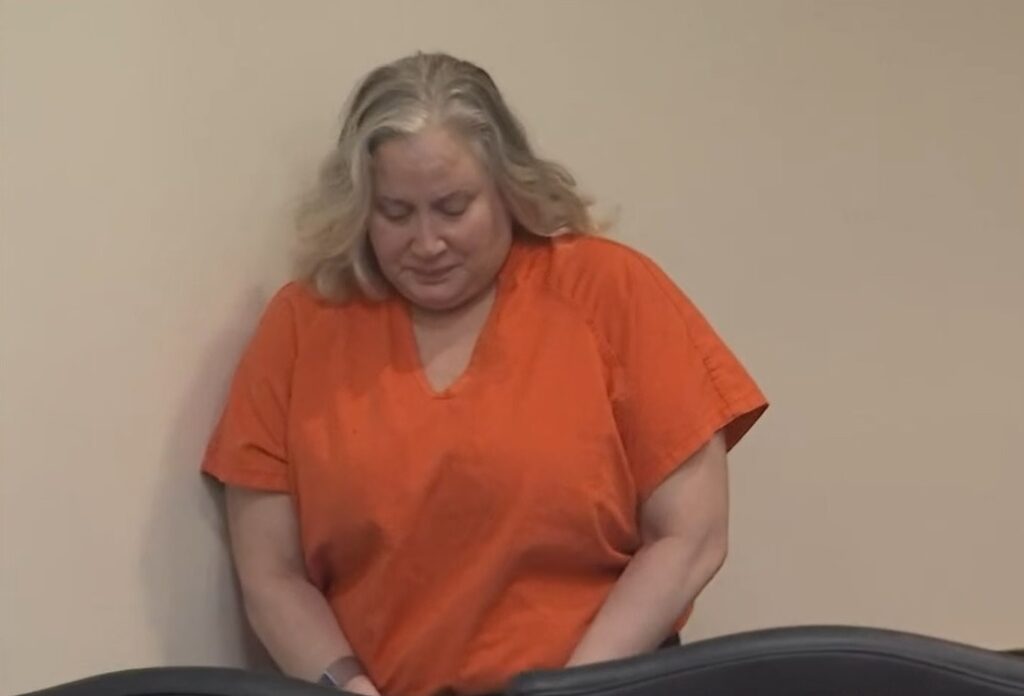On Monday, Tammy “Sunny” Sytch was sentenced by a Florida court to 17 years for causing the death of Juilan “Fran” Lasseter, the driver of a vehicle that Sytch crashed her car into while over three times the legal blood-alcohol limit. Sytch had earlier pleaded no-contest to the charges, which were laid after the accident in May 2022.
During Tuesday’s sentencing hearing, judge Karen A Foxman heard testimony from medical experts who testified as to Sytch’s historical addiction issues, her past legal problems – including a history of DUi incidents, and opined on other contributing factors that could have contributed to Sytch’s state of mind, in arguing for a sentence less than the maximum 25 years that Sytch could have served.
Victim impact statements were then delivered by Lasseter’s brother and his daughter, Whitney. His brother urged the judge to apply the maximum sentence, noting that if Sytch received the maximum, she would be the same age upon her release as Lasseter was when he was killed.
In her statement, Whitney talked about her father’s love of his family and the community, including, ironically, him volunteering for an organization that provides supports for addicts. She noted that her father used to take her children to live WWE events, and often had his grandchildren in the car when he traveled along the route that he was on when he was hit and killed. She added that the maximum sentence is not long enough in her view.
After a short recess, Sytch – looking significantly different than in her heyday as the blonde bombshell Sunny, tearfully read a prepared statement, apologizing to the Lasseter family and pleading with the judge for leniency in her sentencing.

Tammy Lynn Sytch at her sentencing hearing – November 27, 2023
In her statement, Sytch noted that she had applied to college for a medical degree because she “… wanted to help people through their pain and suffering.” Citing the Hippocratic Oath, she noted she broke that oath with Lasseter’s death, conceding that “I did the opposite of that… I did harm to someone else.”
Sytch noted that during her time as a professional wrestler and celebrity, she did use that platform to help people, including helping a person who was having a seizure at a convention.
But she did admit that her path swayed from her medical career, and after the death of her fiancee Chris Candido, her life spiraled.
“I try to think back to what caused my downfall,” she said. “I think it starts with the death of my fiancee, Chris. I hated myself for not being able to change things for him. To not keep him safe.”
Through tears, Sytch apologized to the Lasseter family for the loss of Julian, and expressed regret for her actions that resulted in his death.
Directing her comments to his family, she said, “I am truly sorry. I know my words are not enough, but please know that I think about you every day. Every second of every day.”
To the judge, she made a case as to why she should not receive the full sentence, including going to rehab, seeking therapy for mental health and substance abuse.
“I will do whatever I can to make the changes I need to ensure this doesn’t happen again. I refuse to go backwards and make the same mistakes again. the pain I feel in my heart… haunts me in my nightmares. If I could turn back time, I would. If I could find a way to change the events of that day, I would in a heartbeat. I I could exchange places with Mr. Lasseter and take his place, I would.”
Sytch suggested that instead of being jailed for a lengthy period, she could do better by being incarcerated for a shorter time, going through therapy, and then being released back into society where she could commit herself as an example to help others learn from her myriad of mistakes.
“I can be a true asset to the community by educating youth and adults on the dangers of drinking and driving. I have done something horrible, but I am so much more than the worst that I have done. A precious life was lost that tragic day, and I am incredibly sorry for that. I would ask for the opportunity to be released in society in order to contribute to it.”
Sytch’s lawyer echoed those points in his closing argument. He noted that by pleading no-contest, Sytch didn’t want to prolong the pain caused to Lasseter’s family through a lengthy trial. He noted that she was aware, when making that plea, that she would face punishment – but that various factors – including misdiagnoses and missed diagnoses for mental health issues – should compel the courts to consider probation to allow Sytch to get the help she needs.
The prosecuting attorney argued that Sytch’s history of criminal issues, including multiple DUIs and other driving offenses and the related arrests and imprisonments, did not support the arguments for leniency.
“As far as her rehabilitation,” the prosecutor said, “she has failed that rehabilitation. If anything, she has had escalating behaviour to the point that all of those priors involve substance abuse, driving, and disregarding the law.”
In rendering her decision, Foxman noted the tragedy of the loss of Lasseter’s life and the reckless disregard for the law that is represented in a DUI Manslaughter case. The judge noted that the defense did not meet the standard to prove under a preponderance of the evidence that she needed specialized treatment, which is a condition that must be met for imprisonment to be taken off the table, explaining that the symptoms she exhibited do not seem unrelated to her addiction issues – and that the treatment of those symptoms could easily be received in the incarceration system.
Calling the arguments against Sytch as “egregious” the judge listed various factors contributing to her decision, including: Sytch’s admitted intoxicated state, the fact that a vodka bottle was found in the car she was driving when she hit Lasseter’s vehicle, and that she had nearly caused another accident shortly before hitting Lassetter’s vehicle.
“Through no fault of his own,” she concluded, “I can see nothing Mr. Lasseter could have done to prevent this.”
In not imposing the maximum sentence, the judge did acknowledge that Sytch did have serious addiction issues, had experienced some tragedies in her life. and had taken responsibility for them through her no contest plea, but noted that “that doesn’t absolve (her) for the crimes.”
Sytch’s sentence breakdown included the following penalties:
- On the various driving-related misdemeanours, 364 days sentence with credit given for 364 days already served
- On the DUI under a Suspended License causing Death of Serious Bodily Injury charge, 10.665 years imprisonment, with 566 days credited for time already served
- On the DUI Manslaughter charge, 7 years imprisonment to be served after the aforementioned 10.665 years
- After serving her time, Sytch will also face 8 years on probation, with the following conditions imposed:
- She must undergo a substance abuse evaluation, and take an alcohol safety course
- She will have to take a victim awareness program, and perform 50 hours of community service
- She will have to pay a $10,000 fine
- Her Drivers License will be permanently revoked
Sytch has 30 days to appeal the sentencing.
RELATED LINK
